M, the classic serial killer hunt from Fritz Lang...
Introduction
Child murderers are a staple of modern film and TV these days and these crimes never fail to shock and galvanise the nation whenever they tragically occur in real life. What may be surprising, however, is that at least one man attempted to bring the shock of a child serial killer hunt to the fledging cinematic industry back in 1931 in Germany. That man was Fritz Lang, undisputed master of cinema and creator of Metropolis, a science fiction film whose influence can still be felt today and played a prominent part in the Queen video Radio Gaga.
Premiering in 1931, Fritz Lang's M was influenced but not specifically based on real life cases of serial killers such as Peter Kürten, tried and executed by guillotine in 1931 after confessing to 79 separate offences (murder, attempted murder and sexual assaults) but charged with 'only' nine murders and seven attempted murders. Lang's murderer is a quiet man called Hans Beckert (Peter Lorre) who has a penchant for young girls, chatting to them in the street and leading them away with promises of balloons and sweets.
The police, led by Inspector Lohmann (Otto Wernicke), are getting nowhere with their manhunt and after increased rewards for information harbour no results, struggle to come up with ideas on how they will trace their man. Meanwhile on the other side of the law criminal organisations, led by Safecracker (Gustaf Gründgens), are getting a little hacked off with the effect that increased police activity is having upon their own criminal activities. They decide to take matters into their own hands and try to track down the killer and mete out their own kind of justice, enlisting the city's legion of beggars to watch over the children and find the murderer.
Whilst the police have no clues yet as to the identity of Beckert, he made the mistake of whistling Grieg's In The Hall Of The Mountain King whilst buying a balloon from a blind balloon seller for his latest victim Elsie Beckmann (Ingrid Landgut). This appears to be his calling card and gives him away when the blind balloon seller recognises the whistled tune and sets one of his accomplices after the man who couldn't help but put his lips together and blow. Some quick thinking by the young man following Beckert finds the murderer unwittingly being tracked through the city by the imprint of the letter M on his rear shoulder in chalk, thus the overlap of tracking beggars never lose sight of him, eventually cornering him in an office block.
The police investigation has also now come to the conclusion that Beckert is the child murderer and the race is on to see who can bring him to justice…
Visual
Overall the picture on the main feature is fantastic but it's not completely like that. The reason for the difference is that despite the rather comprehensive restoration process on the original negative, not all of it was there to be restored - only 96 minutes in fact. Missing scenes were located on prints from both the Netherlands Filmmuseum and Cinémathèque Suisse in varying conditions and therefore what you have is the most complete version of the original film, running at approx 110 minutes and still 7 minutes short of the version approved by the Berlin Film Censorship Office in April 1931, but with some frames/scenes looking somewhat worse than the majority of it - still, in my opinion anyone interested in viewing this film (and let's face it the audience is likely to be small) will be able to forgive some severe scarring in order to watch the complete film.
The secondary feature of the English version of M is not of the same quality as the main feature, perhaps understandably as the primary focus and main recipient of what is likely to have been a costly process is the original language version. Therefore expect a rather more obviously aged and damaged print.
Audio
The sound on the German language version is a DTS-HD Master Audio 2.0 soundtrack is nice and clear with optional English subtitles. The only time the sound got a little harsh was during the trial scene at the end with a lot of people shouting, but then that's the effect you'll get anyway so nothing worth worrying about.
What is rather perturbing is the inclusion of complete silence in some scenes, particularly where there are vehicles involved. As this was Lang's first 'talkie', I'm guessing that he wanted to focus on the dialogue and omit any extraneous noise. I was a little confused at first with the silence, but upon reflection it is well designed by the master of cinema.
Extras
Audio Commentaries - there are two included, the first by German film scolars Anton Kaes and Eric Rentschler with the second featuring film restoration expert Martin Koerbler, filmmaker Peter Bogdanovich and historian Torsten Kaiser with excerpts included from Bogdanovich's interview with Fritz Lang from 1965. I haven't listened to either of the commentaries as yet so can't really comment on their quality.
British Version of M - the original 93 minute 1932 British release of the film featuring Peter Lorre in his first English performance. Other than being shorter, there are also alternate takes of scenes using different actors.
Zum Beispiel Fritz Lang - a 21 minute interview with Fritz Lang by Erwin Leiser which discusses mainly the banning in Nazi Germany of Das Testaments Des Dr Mabuse by Minister of Propaganda Joseph Goebbels and the Lang's subsequent interview by Goebbels in which Lang was offered the position of head filmmaker for National Socialism (Lang fled Germany for France the same day).
Booklet - rather fine detailed and well illustrated 48 page piece with the following contents:
Film credits
My Film M - A Factual Report by Fritz Lang (from Die Filmwoche, May 20 1931)
Fritz Lang on M: An Interview conducted by Gero Gandert (1963)
The Missing Scene introduced by Anton Kaes
Mörder - Meurtrier - Murderer: The Multi-Language Versions of Fritz Lang's M by Robert Fischer
Notes On The Restoration
Overall
M is a classic film in all senses of the word, a mix of police procedural and high drama using a subject that would have been shocking to its audience of the time. A fantastic psychological thriller, it also takes a rather more level-headed approach to the subject of child killers than either the general public at large or the press have ever taken. Peter Lorre is absolutely fantastic as the both child-like and sadistic Hans Beckert, his look of sheer terror upon discovery of the M and the subsequent chase is the iconic image of this film.
What really surprised me about this film, outside the brilliant restoration of the picture, is that it was nearly two hours in length during an age where I assumed most films were quite short. The thing is though that M doesn't feel like a long film, and part of that is down to some great editing and some rather novel shots by Lang - two of which really stood out for me are the overhead shot of a crook emerging from a hole in the floor into a circle of waiting policeman and the rather grotesque low rising diagonal shot of Lohmann at one of his lowest points with his investigation seemingly going nowhere.
I don't know much about the real life cases that this film is based on (bar the details provided earlier) but there are elements that can't help but remind me of both the Jack The Ripper and Yorkshire Ripper cases where the killer communicates with the police via the press to taunt them about not capturing him. This is very much a staple of film and TV as well as the signature motif captured so hauntingly using Greig's classical piece, with director Lang performing this piece as star Lorre couldn't whistle.
The Masters Of Cinema series released by Eureka is currently proving to be an exceptional set of quality releases and this is set to continue with the re-release of Metropolis later in the year. In the meantime, delve into the world of classic cinema with cinema's first serial killer hunt, M.
Highly recommended.
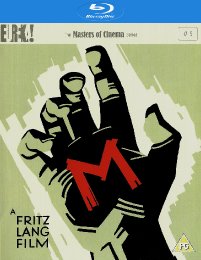
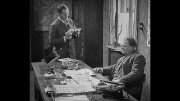
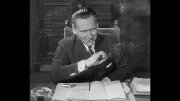
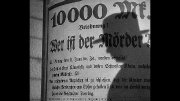
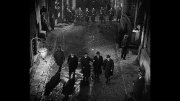
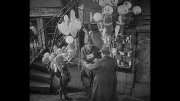
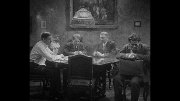
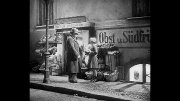
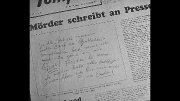
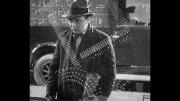
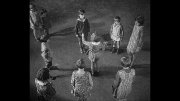
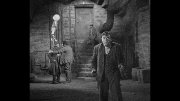
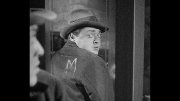
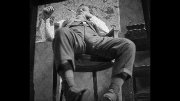
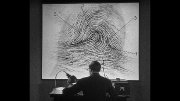
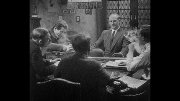
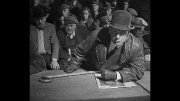
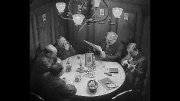







































Your Opinions and Comments